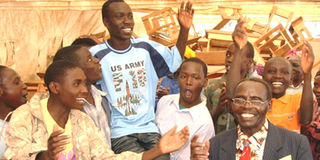Top marks for orphaned and displaced boy

Sixteen-year-old Amusavi Kevin Musa, an orphan, is carried shoulder high by poll violence victims at Eldoret Showground camp for his exemplary performance in KCPE. He got 390 marks — the highest score for internally displaced pupils. Photo/ JARED NYATAYA
Talk of achieving against all odds. An orphan displaced from a children’s home due to post-election violence emerged the top candidate among chaos victims in the Kenya Certificate of Primary Education.
Amusavi Kevin Musa, 16, scored 390 marks to lead 213 pupils who sat for the examination at Eldoret IDP School in which the last candidate got 77 marks.
The highest candidate in Rift Valley Province where the camp is located, scored 452 marks.
“I would have performed better were it not for the challenging life at the camp,” Musa, who is among the poll violence victims at the Eldoret showground camp, said.
He was initially housed at Musingen Children’s Home in Eldoret North District. The candidate’s teachers, who were joined by curious IDPs, thronged the only school after word went round that the centre registered an impressive performance.
It was excitement at the camp as parents and teachers mobbed the pupil to congratulate him for the excellent performance, irrespective of difficulties he underwent following the violence.
But before then, there was anxiety at the school as they waited for the candidate for more than an hour to come and check the results. He finally arrived after trekking for about four kilometres from Eldoret Town.
“I’d gone to town to check in the newspapers whether my name was among the top ranking candidates in the country after the release of the examinations,” the seemingly shy boy said.
And his head-teacher, Stanley Wanyoike, said: “It is through dedication and sacrifice that the pupil managed to score such a grade. He tried his best amidst the harsh circumstances.”
He appealed to the Government and well-wishers to help the candidate realise his academic dream. The parents said the performance was good, given that most of the candidates in the camp started learning in Second Term. Some parents had to transfer their children and register them to schools they deemed safer.
“New environment due to new examination centres was also a challenge, as they took time to familiarise themselves with the places,” camp chairman Ndung’u Wanjohi said.
According to some parents, pupils could not concentrate in class as they were worried about the plight of their parents and siblings in the camps.
Parents and guardians early this year allowed the Government to register their children in various examination centres countrywide, as they were not sure of the direction the violence could take.
Mr Wanyoike said 228 candidates registered for the exams, but 15 did not turned up. In an interview, Mr Wanyoike said one candidate died at the camp, while the whereabouts of the other 14 candidates was not known by the school in which 107 boys and 106 girls sat for the examinations.
“They started studies late, and we often taught on Sundays so that we could catch up with others,” Mr Wanyoike said.
To help him teach the Standard Eight pupils, together with Unicef, were five TSC staff and four volunteer teachers.
He said the school lacked text books because they were not allocated Free Primary Education, but some well-wishers donated a few books, which did not match the curriculum.
During the exams, he said, the school lacked 12 wall clocks for the 12 centres set up at the neighbouring Race Course Primary School.




